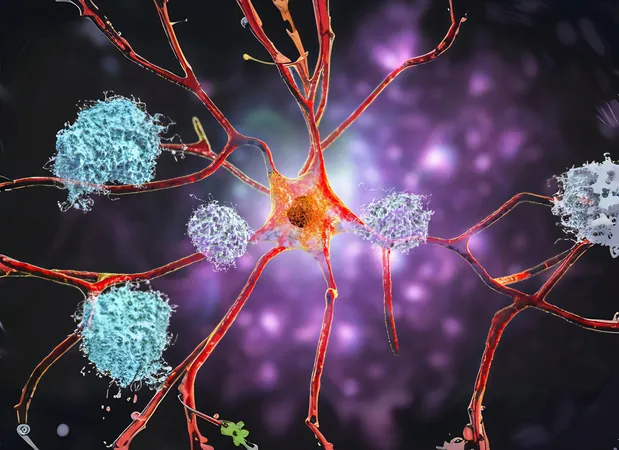
Shocking New Research Reframes Alzheimer’s Disease: Is It Really a Brain Disorder?
2024-12-04
Author: Ming
The fight against Alzheimer’s Disease has reached a pivotal point, challenging long-held beliefs and opening the door to contentious discussions. New research suggests a radical reevaluation of Alzheimer’s may be on the horizon, bringing to light the potential role of the immune system in this debilitating condition.
Was Groundbreaking Research Fabricated?
A seismic shift occurred recently in the Alzheimer’s research community, catalyzed by revelations surrounding a landmark 2006 study published in the prestigious journal *Nature*. This study implicated the beta-amyloid protein in the onset of Alzheimer’s, positioning it as a primary culprit behind the disease. However, findings presented in *Science* raise alarming questions about the authenticity of the data, suggesting possible fabrication.
The situation intensified in June 2021, when the FDA approved aducanumab, a drug aimed at reducing beta-amyloid levels in the brain. The approval was controversial due to the inconsistent and incomplete evidence supporting the drug's effectiveness. As a result, debates surrounding its application reflect a broader uncertainty: Why do millions still await a definitive cure for Alzheimer’s?
Rethinking Beta-Amyloid
Traditionally, scientists have been laser-focused on the beta-amyloid protein, believed to lead to dementia through the formation of sticky plaques that impair communication between brain cells. Despite decades of effort, researchers have made little progress in understanding and mitigating the harmful effects of beta-amyloid accumulation. It's becoming increasingly clear that focusing solely on this protein may have blinded scientists to other critical factors influencing Alzheimer’s disease progression.
A New Perspective: Immune System Involvement
Recent findings from the Krembil Brain Institute in Toronto suggest a revolutionary perspective: Alzheimer’s might not be strictly a brain disease but rather a disorder rooted in the brain’s immune response. According to Donald Weaver, a professor at the institute, "We no longer think of Alzheimer’s as primarily a disease of the brain. Rather, we believe that Alzheimer’s is principally a disorder of the immune system within the brain."
The immune system plays a pivotal role in repairing injuries and warding off infections across all bodily organs, including the brain. Researchers propose that beta-amyloid is not inherently harmful but serves a protective function. Yet, in its misguided quest to fight threats—due to similarities between bacterial and brain cell membranes—beta-amyloid may inadvertently attack neural cells. This misidentification contributes to the degradation of brain function, leading to dementia.
Alzheimer’s as an Autoimmune Disease?
This emerging perspective places Alzheimer’s within the broader category of autoimmune disorders, where the body turns against itself. Researchers remain optimistic that by tapping into other immune-regulating processes in the brain, viable treatment options may be discovered.
Additional theories are also gaining traction, with some experts considering Alzheimer’s as a mitochondrial disorder or associating it with specific brain infections or abnormal metal handling processes.
The Urgent Need for a Paradigm Shift
With over 50 million individuals globally suffering from dementia, fresh insights and inventive potential therapies have become paramount. Alzheimer’s is not merely a healthcare emergency—it's a socio-economic challenge that necessitates a comprehensive understanding of its origins, be it through immune system links or other etiologies.
Scientific advancements must prioritize the human experience, emphasizing improvements in the quality of life for Alzheimer’s patients. It’s crucial for ongoing research endeavors to align with the real-life needs and experiences of those affected, ensuring that breakthroughs translate into tangible benefits for communities grappling with this crisis.
This groundbreaking study is now published in *Science*, underscoring the need for invigorating dialogues and collaborations aimed at demystifying this enigmatic disease that continues to challenge our understanding of brain health.
Stay informed with the latest research discoveries and advancements in the fight against Alzheimer’s!

 Brasil (PT)
Brasil (PT)
 Canada (EN)
Canada (EN)
 Chile (ES)
Chile (ES)
 España (ES)
España (ES)
 France (FR)
France (FR)
 Hong Kong (EN)
Hong Kong (EN)
 Italia (IT)
Italia (IT)
 日本 (JA)
日本 (JA)
 Magyarország (HU)
Magyarország (HU)
 Norge (NO)
Norge (NO)
 Polska (PL)
Polska (PL)
 Schweiz (DE)
Schweiz (DE)
 Singapore (EN)
Singapore (EN)
 Sverige (SV)
Sverige (SV)
 Suomi (FI)
Suomi (FI)
 Türkiye (TR)
Türkiye (TR)